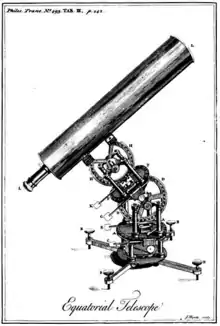1710 in science
The year 1710 in science and technology involved some significant events.
| |||
|---|---|---|---|
|
| 1710 in science |
|---|
| Fields |
| Technology |
| Social sciences |
|
| Paleontology |
| Extraterrestrial environment |
|
|
| Terrestrial environment |
|
|
| Other/related |
Events
- The Royal Society of Sciences in Uppsala is founded in Uppsala, Sweden, as the Collegium curiosorum ("College of the Curious").
Astronomy
- Edmond Halley, comparing his observations with Ptolemy's catalog, discovers the proper motion of some "fixed" stars.[1][2]
Physiology and medicine
- Alexis Littré, in his treatise Diverses observations anatomiques, is the first physician to suggest the possibility of performing a lumbar colostomy for an obstruction of the colon.
- Stephen Hales makes the first experimental measurement of the capacity of a mammalian heart.[3]
Technology
- Jakob Christof Le Blon invents a three-color printing process with red, blue, and yellow ink. Years later he adds black introducing the earliest four-color printing process.
Zoology
- René Antoine Ferchault de Réaumur produces a paper on the use of spiders to produce silk.
Publications
- John Arbuthnot publishes "An argument for Divine Providence, taken from the constant regularity observed in the births of both sexes" in Philosophical Transactions of the Royal Society of London.[4]
Births

James Short's telescope
- April 15 – William Cullen, Scottish physician and chemist (died 1790)[5]
- April 25 – James Ferguson, Scottish astronomer (died 1776)
- May 18 – Johann II Bernoulli, Swiss mathematician (died 1790)
- June 10 – James Short, Scottish mathematician and optician (died 1768)
- July 21 – Paul Möhring, German physician and zoologist (died 1792)
- August 13 – William Heberden, English physician who gives the first description of angina pectoris (died 1801)
- August 20 – Thomas Simpson, English mathematician (died 1761)
- September 3 – Abraham Trembley, Genevan naturalist (died 1784)
Deaths
- February 25 – Daniel Greysolon, Sieur du Lhut, French explorer (born c. 1639)
- July 25 – Gottfried Kirch, German astronomer (born 1639)
- September 23 – Ole Rømer, Danish astronomer (born 1644)[6]
- Jean de Fontaney, French Jesuit mathematician and astronomer (born 1643)
References
- "Edmond Halley (1656-1742)".
-
- O'Connor, John J.; Robertson, Edmund F., "1710 in science", MacTutor History of Mathematics Archive, University of St Andrews
- Forssmann, Werner. Nobel Lecture in Physiology or Medicine, 1956.
- Arbuthnott, J. (1 January 1710). "An Argument for Divine Providence, Taken from the Constant Regularity Observ'd in the Births of Both Sexes. By Dr. John Arbuthnott, Physitian in Ordinary to Her Majesty, and Fellow of the College of Physitians and the Royal Society". Philosophical Transactions of the Royal Society of London. 27 (325–336): 186–190. doi:10.1098/rstl.1710.0011. Reprint.
- "William Cullen | Royal College of Physicians of Edinburgh". www.rcpe.ac.uk. 8 February 2017. Retrieved 3 December 2020.
- "Ole Rømer - Danish astronomer". Encyclopedia Britannica. Retrieved 3 April 2018.
This article is issued from Wikipedia. The text is licensed under Creative Commons - Attribution - Sharealike. Additional terms may apply for the media files.